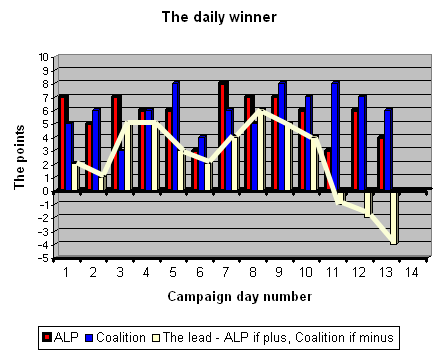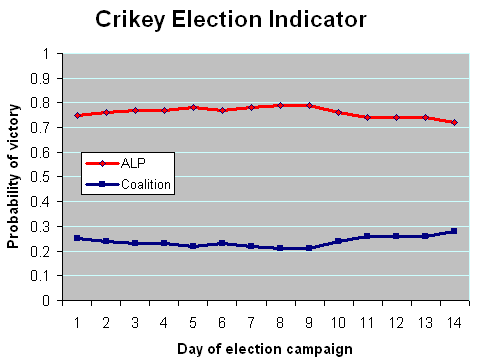This is getting serious. For five days in a row by my assessment Labor has lost the media battle of words and pictures. The prime minister just cannot seem to get away from talking about Kevin Rudd — a subject she would love to ignore.

Yesterday Julia Gillard continued her macho woman approach by making a threatening, but completely hollow, promise to sack from a future Gillard Cabinet any minister naughty enough to leak details of a Cabinet meeting to a member of the press. It might sound wonderful but the trouble about leaks is that ministers do not put their hand up for making them and do not confess if and when confronted.
Proof of disloyalty will be hard to get unless Gillard is prepared to resort to the good old days when the Country Party’s Deputy Prime Minister John McEwen called on Prime Minister Harold Holt to have ASIO tap the phone of his Cabinet rival, Treasurer Billy McMahon, to get proof that Billy really was leaking to then newsletter publisher Max Newton for whom I worked at the time.
Billy was leaking, of course. It was a highlight of my Sunday afternoons to answer the phone to hear his squeaky voice calling in to give Max a weekly Cabinet meeting update. Not from his home phone, mind you, but from a Woollahra public phone box to because the Treasurer guessed he was under surveillance.
It didn’t do the McMahon career any harm either. With the retirement of Black Jack, the leaker went on to achieve his goal of becoming Prime Minister after another act of political bastardry when he led the coup against incumbent Liberal Leader John Gorton before Gorton, like Kevin Rudd, had been allowed to complete his first term after winning an election.
Perhaps Tony Abbott would like to reflect, incidentally, on that little episode before again pretending that there was something unique about the deposing of Rudd when it just followed on in the grand precedent established back then by the Liberal Party. The only difference between the two Prime Ministerial assassinations that I can see is that in the McMahon/Gorton case the party room was equally divided whereas with Gillard/Rudd it was not a contest at all because the challenger had such a clear majority of the votes.
Not that such matters are at all relevant to this continuing election campaign where the great fear of the Labor campaign brains trust must be that another embarrassing revelation will be dropped by the phantom leaker. It is perhaps because of that apprehension that the Crikey Election Indicator continues to move slightly in the Coalition’s favour.








I get why there’s this venerable tradition in Australia of reporting all politics as a sport (pretty everything here gets reported as a sport), and you’ve got umpteen decades of political reporting, spin, and all around nous that you’re kindly sharing with the rest of us, but can you actually point to an election where the campaign (by which I mean the period from the visit to the GG to the election Saturday) has ever made a jot of difference? Name an election in modern times where the result hasn’t been predicted by the polls 3 to 6 months out?
Possibly 1993? But not if you factor in preferred PM.
I guess I am completely jaded by the media’s incessant, boorish need to not only report the news (in the eternal present, as B. Keane accurately points out) but also to be the news. In Crikey’s favour, it is no where near as bad as Fairfax, News, and the ABC, which have all sunk to ridiculous new lows in the race for eyeballs (and eardrums).
Perhaps 1987 when I think some mistakes that John Howard made in his accounting hurt him and I agree about 1993 but think the deciding factor was in the final days when television featured an Opposition Leader shouting from the back of a truck at a demonstrating crowd.
Apart from those – and I am not sure about them either – campaigns have not made much of a difference in my experience. The fundamental factors are either a public getting bored with a long term government – 1972 and 2007 – and changing it because things were going well enough so the risks seemed minimal or a government being rewarded with a win or punished by a loss (Labor 1975 and 1996) because of economic conditions.